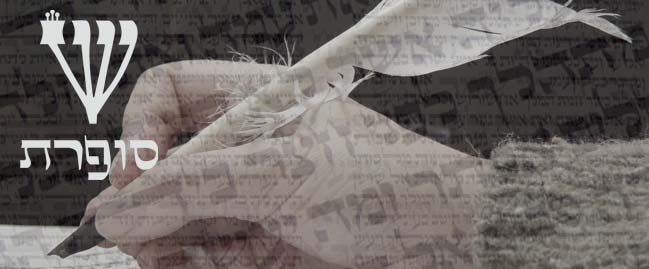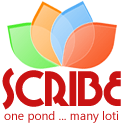THE BASICS
בס"ד
2 Adar
People really enjoyed this post, but asked me privately about the basics. So here goes:
10 basic requirements for writing any article of sofrut (according to the line of succession to which I belong) in no particular order:
1) Be shomer/et mitzvot (ie, keep Hilkhot/the laws of Kashrut, Shabbat, Niddah [whether or not you are married], etc)
2) Make the formulaic declaration of proper intention over your work before you begin (& actually have that proper intention as well)
3) Make the verbal sanctification over each of G@d's 7 most holy names before you pronounce & write the first letter of any of those names (& mean it)
4) Daven the minimum required daily prayers
5) Keep Hilkhot Mezuzah
6) Ladies, if you're going to make tefilin, then lay them each day
7) Use only appropriately prepared parchment from a kosher animal over which the proper intention has been spoken
8) Use no "base" metal, such as steel or bronze, in any stage of manufacture
9) Be scrupulous in copying the text from either an approved Tiqun Le-Sofrim or from an existing equivalent, like another Sefer Torah or Mezuzah...
10) Become familiar with about 4,000 rules. I'm not kidding.
You might notice the omission of things like "be a good person" from this list. Please don't think that what I mean by this, as some of this blog's commentors have, that performing empty rules without real life moral practice is sufficient. How to "be a good person" is beyond the scope of this blog - in fact, it's beyond the scope of what most people can cover over the course of their entire lives, since learning this is the whole point of living on Planet Earth...
The idea here is that commandment-conscious individuals will be slowly taught how to "be good people" in the eyes of G@d, who we do all our work for anyway.
As usual, I invite respectful dialogue...
Technorati tags: religion, Judaism, Torah, Canada, journal, weblog, blog, diary, school, Israel.














13 Comments:
She did say that these rules are "according to the line of successtion that" she belongs to, i.e., her tradition.
בס"ד
Since a Sefer Torah is meant to bring Chai/Life & Shalom/Peace to the world & metals such as steel were & still are used to make instruments of war, the Mesorah/Tradition I learned from my soferim calls us to keep from using anything that could be associated with war in its manufacture.
When writing a Sefer Torah, Sefardim (Jews from Iberia & North Africa) have traditionally used a reed while Ashkenazim (European Jews) use a quill. The Zohar Hakadosh says that the reed was created for writing. If you use a quill like I do (since my sofrim are mostly Ashkenazi, as am I), it must come from a kosher bird such, like a turkey.
I understand that Chabad won't use turkey quills because they aren't satisfied turkeys are kosher. Because turkeys don't appear in the Torah, being a New World bird, they don't eat them or use their products in sofrut. They will use goose, though.
R' Shimon ben Elazar taught that the altar was created to prolong one's years, and the sword, to shorten them. Therefore, the shortener may not be lifted over the lengthener (Mechilta).
"...& if an altar of stones you make me, don't build them hewn; for if you lift your (iron) tool upon it, you have desecrated it." Sh'mot/Exodus 20:22
בס"ד
Sorry - forgot to put this one in earlier:
"...One should always be gentle like a reed & not unvielding like a cedar. That is why the reed deserves to be made into a pen for writing of The Law, Tefilin & Mezuzot"
- Babylonian Talmud, tractate Ta'anit 20b
& yes, I'm aware that some sofrim use metal, but I was taught to never do so. I keep a mixture of silver & cyanide to plate whatever metal I might need to use on the parchment, like a razor blade. That way only precious metals come in contact with my work.
#4 said: "Daven the minimum required daily prayers". Does that mean
(a) at least the minimum or
(b) not more than the minimum or
(c) exactly the minimum?
בס"ד
Oop - my bad :)
I meant "(a) at least the minimum"
Thanks for asking me to clarify - sorry I wasn't clear.
I think there's a one-letter mistake in the translation of Ta`anit 20b -- it should be "deserved" (or merited -- zakha in the original), which I think changes the lesson from: "One ought to use reeds" to "Reeds are cool, so they're allowed to be used . . ." -- the switch being from "must" to "may". The homiletical lesson is nice, but I don't think it means to automatically exclude anything that is not "soft as a reed".
You forgot number 11: Be revolutionary.
בס"ד
Blackherring - I don't know that we've learned the same things, since I mainly learned Kabbalah of the Letters with your teacher, & Minhag & Halakhah from my own mentor. I'm slowly relating some of what I've learned here in this blog. I'm not sure how you expect me to respond to your comments - are you just stating your opinion that you support the use of metal styluses or are you wanting me to defend my choice to follow the line of tradition I was trained to practice?
Anonymous - Ok, thanks for the input. As my Steinsaltz Talmud is temporarily unavailable, I took the translation from this. I also don't think it means to automatically exclude anything that is not "soft as a reed", neither did I make that claim. I simply said that this is what I learned from my mentor & I uphold it.
Carly - Thanks :)
I've learned that when other people write about what they do, people say, "Oh, that's very interesting", but when I write about what I do, I get a different response.
David - Uh, hyeah :D
BTW, welcome & nice blogs...
בס"ד
Oh, ok, sorry :)
I didn't mean to be provocative, I just wanted to make sure I understood what you were after before I got into a long, involved writing spree. I just didn't want to miss your point & then have everything I write be pointless.
Blog posting isn't the most ideal mode of communication...& I've misunderstood before :}
Of any items on my list, I would have thought you'd take exception to numbers 2 & 3, since there's a machloket/dispute as to whether thinking the proper intention is sufficient, rather than speaking it aloud.
Anyway, it's waaaaaaaay late so I'm going to answer you properly tomorrow - er, uh, later today - but I didn't want to wait to apologize.
Shavu'ah tov!
בס"ד
Ah, now I think I get you - you know we understand each other no problem in person, it's just this digital interface thing...
...& kugel schmugel, but I bet your challah's tasty ;)
בס"ד
So...the knife thing: I also use various types of scalpel blades which I imagine could be used to save lives - except that all I know about performing surgery is from that scene in the "Mulcahy's War" episode of M*A*S*H where the Reverend has to perform an emergency tracheotomy on a soldier with his Tom Mix pocket knife.
So a blade is just a tool, & like a tool, it can go either way - being used for good or evil. Torah is the same way - by your interpretation you can make it ugly, or you can make it gorgeous.
But there's nothing that I remember against knives in the Halakhah or in the homiletics, the thing is the type of metal. We're talking archetypes here.
So I plate all my steel with silver.
בס"ד
Blackherring, I don't think your statement, "... you learned mostly from a sofer and I learned mostly from the sefarim..." is accurate. I learned Mishneh Berurah with R' Ross Singer & both the sofrim I learned with taught me out of the standard sofrut texts such as Qeset Ha-Sofer, Lishkat Ha-Sofer, etc. & each of the sofrim watched me form my letters, cut my quill & score. Also, a little Kabbalah on the side out of Sefer Pardes Rimonim didn't hurt :D
בס"ד
Blackherring:
a) no apology necessary, so don't worry
b) no hate is allowed on this blog, so don't worry
c) you didn't malign me, so don't worry
d) propositions - YAY! ;)
e) don't worry
f) I'd really like to talk archetypes with you
g) did I mention that you should worry?
Post a Comment
<< Home